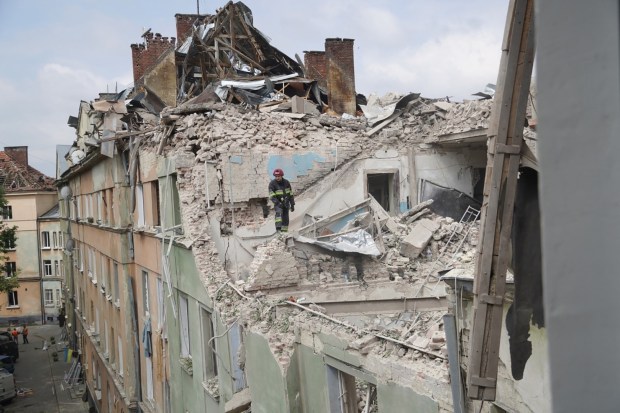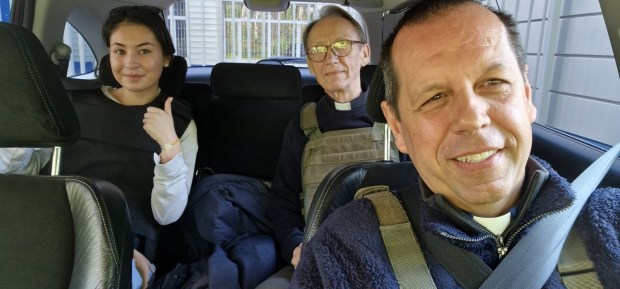Fr. Luca Bovio, a 53-year-old Italian missionary priest in Poland, has been actively involved in helping Ukrainians since the start of the Russian offensive in that country in 2022. Hosting numerous refugees at his parish in Greater Warsaw has led him to travel to Ukraine himself. There, he visits the small communities that are trying to survive, right up to the front line.
Born into a family of Milanese entrepreneurs, Bovio joined the congregation of the Consolata Missionaries in the 1990s. The congregation focuses on small, fledgling churches, notably in Mongolia, where Pope Francis will be visiting next month. Fr. Luca was sent to Poland 15 years ago, where he currently lives in community with five confreres from Argentina, Kenya, Mozambique, Congo, and Tanzania.
The Italian priest is also the national secretary of the Pontifical Mission Societies in Poland. As such, he travels to all the country's dioceses and seminaries to spread a spirit of missionary openness, particularly toward the countries of the South. However, for him Poland is above all a springboard for missionary work in Eastern Europe.
"I’ve visited many countries — Belarus, the Baltic states — and I also went to Ukraine for the first time in 2017. There were already signs of war, but it was confined to the Donbass," he recalls.

Mass exodus and wave of solidarity
From the time of Russia's large-scale offensive in February 2022, the first waves of refugees led the Consolata Missionaries to become involved with Ukrainians in exodus. "During the first phase, the small locality where we reside took in over 2,500 refugees," he recalls. "These people carried heartbreaking stories," explains Fr. Luca, who was struck by the massive help coming from Italy.
"Many parish groups, scouts and individuals came to help, some of them several times," he points out, mentioning the effective collaboration of a nurse from Turin, a doctor from South Africa, and a volunteer from Canada.
Working closely with a large neighboring parish, the Consolata Missionaries have organized a massive aid effort. They are striving to cope with a flow that, at the peak of arrivals, amounts to several hundred new people a day. "It's very beautiful not to do things alone, but to learn to help each other," he stresses.
Then, Fr. Luca was invited by Fr. Leszek Kryża, a priest of the Society of Christ for Polish Emigrants and the coordinator of aid to Eastern Churches within the Polish episcopate, to go to Ukraine for several trips, together with Rika Itozawa, a Ukrainian of Russian and Japanese ancestry. The first attempt was a providential failure: having forgotten his passport, Fr. Luca was unable to cross the border by car, but instead joined the queue of refugees as a pedestrian, sharing their plight for four hours. This experience made him physically aware of the extreme precariousness of their situation.

Supporting those who remain
Fr. Luca was then able to take part in six trips to Ukraine, getting closer to the front line. "We went as far as Kharkiv, Dniepr, Zaporijia," recounts the Italian priest. They were subject to intense stress during the first nights of bombing. "You can feel the fear. On my first night in Kharkiv, in November 2022, I was on the alert for the first suspicious noise. You're always afraid of being hit by a missile, but to see that some people continue to live there in the midst of war gives you courage," he explains.
On his rounds with Fr. Leszek, one of the best experts on the Catholic network in Ukraine, Fr. Luca has sought to distribute clothing and food, as well as small generators, particularly to cope with the power cuts caused by the bombing of power stations. Thanks to a donor in Milan who regularly buys stocks of diapers, Fr. Luca has also been able to supply some to Ukrainian hospitals.
The aim is to distribute the aid to as many communities as possible, including in particular to the only Catholic parish in Kherson that has remained active — for 15 to 20 people. A "courageous parish priest" remains despite the bombardments and shootings that punctuate daily life in this town close to the front line, says Fr. Luca. Those who continue to live there are often the elderly and disabled, who cannot and do not want to travel, but who need special pastoral care.
These people bear witness to Ukrainian resistance, as do the students in Kiev who continue to attend university despite the frequent alarms.
Fr. Luca also remembers a farmer on his tractor who was going to work in his field as if nothing had happened, while missiles were falling nearby. "It’s a powerful choice, showing that his life is here," the priest says, explaining that beyond the horrors of war, this almost normal life is also "a reality we need to show." Indeed, this is how the Ukrainian population is still seeking to sow the seeds not only of its survival, but of its rebirth.



